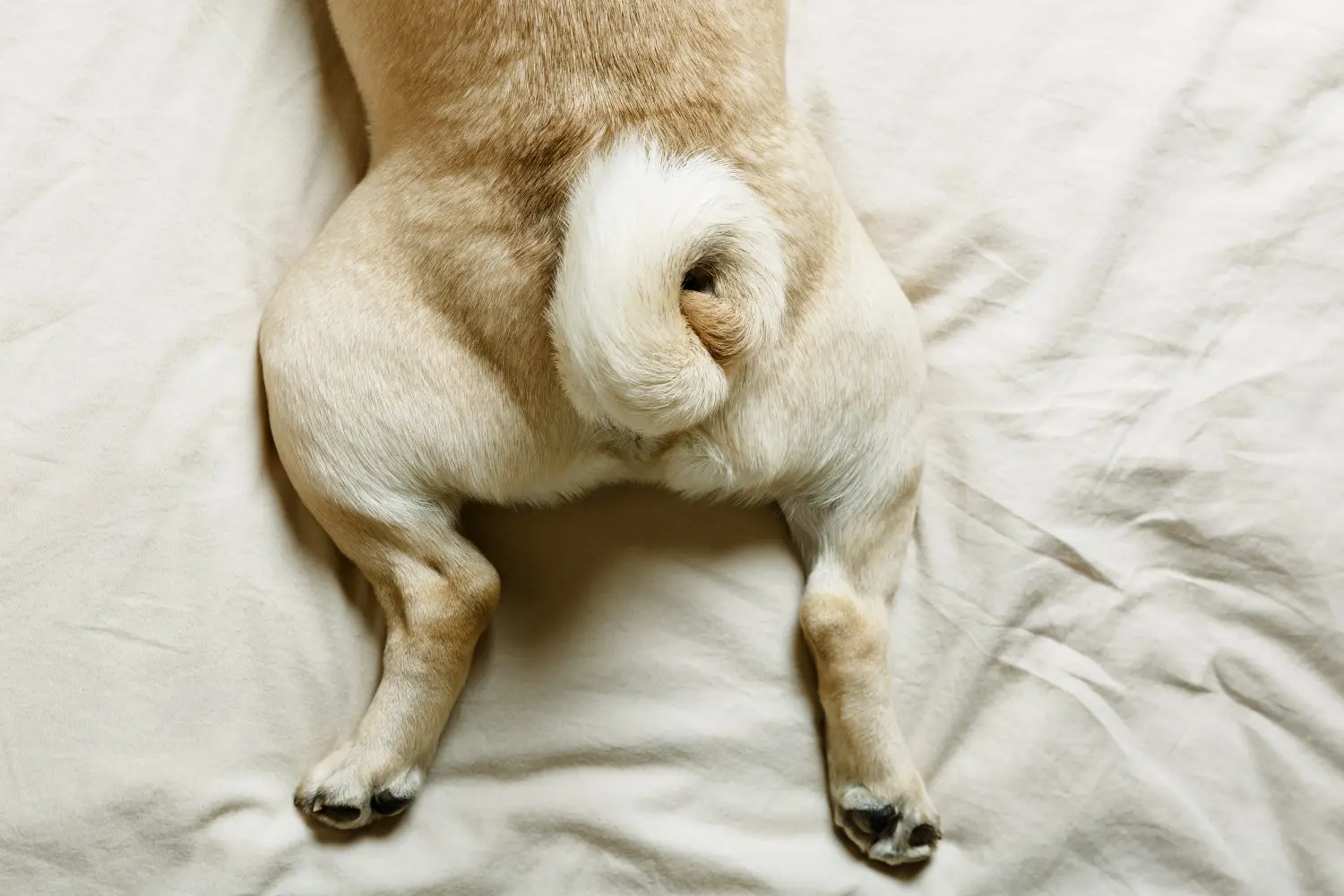
Sometimes we blame it on the dog, and sometimes it actually was the dog! If you are wondering - why does my dog fart so much? - then this blog is for you. Learn about common causes and simple at-home solutions for dog flatulence.
It's normal for dogs to fart, but when those farts can clear rooms or if your dog is just farting too much, then it's time to learn how to boost your dog's gut health and give your nostrils a break!
You love your dog from their squishy snout down to the tip of their tail, but there are some less pleasant aspects of sharing your home with a dog. That's right, we are talking about butt stuff, more specifically dog farts!
While we may chuckle at the occasional puppy toot, there's more to dog flatulence than meets the nose. When their farts bring a tear to your eye, and not from laughter, their body is telling you that something might not be right.
Read on to learn more about dog flatulence, what causes it, and when you should be concerned about the frequency and intensity of your dog's farts.
Understanding the Biology Behind Dog Farts
To get started, it's important to understand that farts are normal. Everybody farts, even your dog. Though it may not be pleasant, occasional dog farts are nothing to worry about.
As food travels through your dog's digestive tract, it undergoes fermentation in the intestines. This breaks down food and allows for nutrient absorption, but a by-product of this aspect of digestion is gas. Gas in the digestive tract needs to be expelled, and there is only one exit - the backdoor. This is precisely what dog flatulence is.
The reality is your dog farts a lot more than you even realize. Normal gas expulsion is often silent and won't have a notable odour in most healthy dogs, although the occasional smelly fart can happen.
Dogs whose toots are odorous are usually dealing with digestive issues, one which in most cases can be easily solved with a healthy diet and supplements.
Certain factors can exacerbate flatulence in dogs. Diet, eating habits, health, and even breed traits can contribute to how farty your dog is. Figuring out why your dog farts a lot is the first step towards finding a solution.
Common Causes of Dog Farts
Gas is a natural process of the digestive system. Gas is created during digestion and is expelled as needed, but some dogs fart more than others. Poor digestion or a gastrointestinal condition can contribute to more farting than usual in dogs.
If you've ever wondered why does my dog fart so much, or why do my dog's fart smell so bad, then these common dog flatulence causes might help to shed some light:
Eating Too Fast
Dogs who "inhale" their food tend to take in more air when they eat, and this can lead to more gas. The gas created through digestion should result in minimal farts, but those who swallow air with their food are going to be extra gassy. Slow-feed bowls and lick mats are good tools for promoting slower and safer eating habits.
Table Scraps and Mystery Foods
Bad eating habits, like consuming table scraps, garbage, or low-quality food, can lead to digestive upsets and increased gas production. While occasional dog-safe human foods are fine, unnaturally gassy dogs should cut these extra treats out.
Short Snouted Breeds
Some breeds, such as brachycephalic (short-nosed) dogs like pugs and bulldogs, are more prone to gas because they take in more air when they are eating and swallowing. These breeds tend to be gassier in general, but their eating habits are a major factor.
Gassy Foods
Some foods, even healthy ones, can contribute to gas production during digestion. Cruciferous vegetables like broccoli and cauliflower are common culprits, as well as veggies that are high in raffinose, such as asparagus, beans, and brussel sprouts. Sulphur-rich foods can also contribute, like eggs.
Feeding appropriate portions of these types of food is key. Small quantities that are part of a complete diet are typically fine, but feeding these foods as treats in addition to their regular diet can lead to some frequent and unpleasant gas.
Sudden Food Changes
It's normal to change your dog's food at least a few times throughout their life, but how you change their food can affect how their bodies handle it. Quick or sudden diet changes, especially in already sensitive dogs, can cause some temporary digestive problems, like farts.
Illness
Another common cause of excessive dog farting is illnesses or diseases related to the digestive tract. Gastrointestinal conditions like inflammatory bowel disease (IBD), Leaky Gut Syndrome, Constipation, and even worm infestations can contribute to generally poor gut health and the creation of excess gas.
By addressing these various causes and factors contributing to dog farts, you can better understand and manage your canine companion's digestive health, promoting a happier and more comfortable life for your furry friend and your sensitive nostrils.
What Do Your Dog's Farts Tell You

Dog farts come in a variety of "fragrances", ranging from mildly unpleasant to downright offensive. While some may resemble rotten eggs or sulphur, others may have a more pungent aroma reminiscent of dead things.
Part of the charm of dog farts lies in their unpredictability. Just when you think your canine companion couldn't possibly produce anything more potent, they can surprise you with a symphony of scents that would put a skunk to shame.
Whether it's during a cozy cuddle session or a crowded family gathering, dog farts have a knack for making their presence known.
In most cases, dog farts are more comical than concerning, but excessive flatulence in dogs or exceptionally strong odours could indicate an underlying health issue. Excessive or foul-smelling flatulence may be a sign of gastrointestinal distress or dietary intolerance.
If your dog's gas is accompanied by symptoms such as diarrhea, vomiting, abdominal pain, bloating, or changes in appetite or behaviour, it could indicate a more serious health issue.
It's important to take note of any changes to your dog's digestive health so that you can connect with your veterinarian to rule out something more serious. While occasional gas is normal, persistent or abnormal flatulence is their body's way of telling you something might be wrong.
Regular veterinary check-ups and open communication with your veterinarian are essential for maintaining your dog's digestive health and addressing any potential issues before they escalate.
The Art of Blaming the Dog
In the realm of dog ownership, there exists a time-honoured tradition known as "blaming the dog." This age-old practice involves shifting responsibility for any foul odours onto the unsuspecting canine companion. Whether it's a lingering stench in the living room or a noxious cloud wafting through the kitchen, the dog is often the scapegoat for human-induced flatulence.
But remember, it's all fun and games until your dog starts to win the fart war. If you've ever been dutch-ovened by your pooch, then just know it was payback.
The Dangers of Dog Farts
While dog farts may be a source of amusement, they can also pose health risks if left unchecked. Chronic gas and bloating can lead to discomfort, abdominal pain, and diarrhea, compromising your dog's overall well-being.
Moreover, certain dietary indiscretions can result in more than just foul odours. Ingesting toxic foods, such as chocolate, onions, or xylitol, can cause severe gastrointestinal distress and even life-threatening complications.
Additionally, dogs with brachycephalic syndrome are at a higher risk of developing gastric dilatation-volvulus (GDV), a potentially fatal condition characterized by bloating and twisting of the stomach.
Maintaining good gut health is the key to preventing both smelly dog toots and more serious gastrointestinal conditions, even in breeds that are prone to them.
Combatting Dog Flatulence

For dog owners seeking relief from the relentless onslaught of dog farts, there are a few strategies worth testing.
Diet is the very first and most important factor in your dog's gut health, so we always recommend starting there, but there are a variety of practices you can try to help significantly improve your dog's wind issues and improve their overall gut health.
Choosing the Right Food for Digestion
What goes in inevitably comes out, which means the food you feed them could contribute to their gassiness. Dogs with sensitive digestion often struggle with heavily processed foods, which leads to more farts and other digestive issues.
Try upgrading their diet to something more natural. If you prefer the convenience of kibble, try looking for foods that get nutrients from real food ingredients, like these:
For total control over your dog's diet, consider switching to raw dog food. These diets are very minimally processed and are easy to digest. Many pets with digestive issues thrive on raw diets and are often touted as a solution diet for a variety of common dog health issues.
Probiotics for Dogs:
Probiotics, often hailed as the "good bacteria," can work wonders for dogs experiencing gastrointestinal issues. These supplements contain strains of beneficial bacteria that help restore balance to the gut microbiome, promoting smoother digestion and reducing the likelihood of gas and bloating.
When selecting a probiotic for your dog, opt for products specifically formulated for canine use. These supplements come in various forms, including powders, chews, and treats, making it easy to find an option that suits your dog's preferences.
Here are a few of our favourites:
It's essential to consult with your veterinarian before introducing probiotics into your dog's diet, as they can provide personalized recommendations based on your dog's health status and dietary needs.
Embracing the Quirkiness of Dog Ownership
At the end of the day, dog farts are a quirky yet endearing aspect of canine companionship. Through the good times and the gassy ones, your dog is a loyal companion that puts up with your toots, so it's only fair you tolerate theirs.
The next time your pooch lets one rip, take it in stride and appreciate the humour in the moment. After all, life with dogs is never dull – and a little dog flatulence only adds to the adventure.
By understanding the common causes of dog farts and the best methods to support healthy digestion, you can keep your dog's flatulence to a minimum and ensure better overall digestive health. Consider their diet, their eating habits, their lifestyle, and even their breed to determine if your dog's farts are normal or a sign of an issue.
If your dog's farts are cause for concern, then don't hesitate to call your vet. Early diagnosis of digestive issues can mean quicker treatment and recovery.
Dog Fart FAQs
How can I reduce my dog’s gas?
The core of excessive gassiness in dogs is often diet. Stick to high-quality, digestion-friendly recipes, use probiotics or other digestive supplements, and check in with your vet whenever you notice significant or frequent changes to your dog's bowel movements or eating habits.
Are dog farts normal?
Farts are a natural bodily function, but in most dogs with good digestion, farts are not overly noxious and often go unnoticed. The occasional toot from your pooch is fine, but frequent flatulence and farts that are extra stinky could be a sign of a bigger issue.
What foods cause gas in dogs?
While general digestion issues are the most common trigger for dog gas, there are certain foods that can contribute to gas issues. Many junky table scraps can be an issue, but even healthy options like asparagus, broccoli, and eggs and be a factor.
Do probiotics help with gassy dogs?
They can. Excessive gas in dogs is often linked to digestive issues, which can be triggered by certain foods or diet types. If your dog is gassier than usual, then consider adding a probiotic supplement to their food to boost digestion.
.png?width=200&height=66&name=logo%20(1).png)


.jpg)
